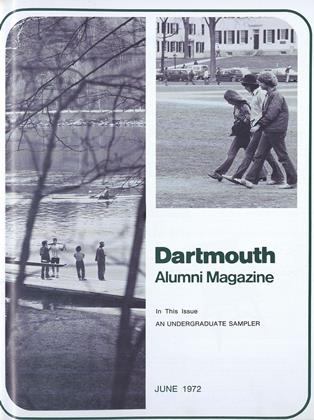TRANSACTIONS: THE INTERPLAY BETWEEN INDIVIDUAL, FAMILY, AND SOCIETY.
JUNE 1972 MARTIN D. MERRY, M.DBy John Spiegel '34, M.D. Edited by John Papajohn, Ph.D. NewYork: Science House, 1972. 455 pp.$16.50.
This volume represents a welcome and even necessary addition to the burgeoning literature on contemporary thinking in the fields ranging from psychiatry to the social sciences. As the jacket declares, "This book provides a bridge from traditional psychoanalytic theory to those social and cultural factors that must be included in a comprehensive approach to community mental health issues." It also represents the presentday culmination of Dr. Spiegel's 25 years of observation and involvement in psychiatry and social sciences, a quarter century significant for the transition of emphasis on the individual and his psychopathology to the consideration of the social and cultural system as a whole. It was favorably received as the primary selection of the March 1972 issue of Psychotherapy and Social ScienceReview. Its rapid and enthusiastic acceptance by the academic community marks this as an important book.
It begins with the establishment of a theoretical framework, drawing upon insights from philosophy, psychoanalysis, psychology, science, social science, and social work. Three levels of organization of inquiry are defined: (1) self-action, where things are perceived as autonomous and no longer responsive to external forces; (2) interaction, the reciprocal relationship between well-defined and essentially unchanging objects; and (3) transaction, the most complex of the continuum, where the organism and its environment cannot be known, one without the other.
Having established his theoretical framework, Dr. Spiegel moves on to present "A Functional Theory of Family Process," his and Florence Kluckhohn's classic studies of "sick" and "well" Irish and Italian families. The focus here is upon the expanding concepts of the psyche, group, society, and culture. He finally proceeds to an application of his concepts to an analysis of urban unrest and campus violence, subjects which have occupied his more recent attention. Dr. Spiegel's positions as Director of the Lemberg Center for the Study of Violence and Professor of Social Psychiatry at Brandeis University lend particular credibility to his views on urban unrest and campus violence.
This is, of course, the briefest of summaries of the complex and profound examination of contemporary American society. Although aimed primarily at professionals, its concepts and language are well within the grasp of the thoughtful general reader. A serious work, with functional if not inspirational prose, it demands a reader's utmost attention. Its seriousness (and its price!) are not aimed at the casual bedtime reader.
Dr. Merry is Resident in Psychiatry at theDartmouth-Hitchcock Mental Health Center.
 View Full Issue
View Full Issue
More From This Issue
-
 Feature
FeatureThe Future of Liberal Arts Education at Dartmouth
June 1972 -
 Feature
FeatureDartmouth Men and the World: Three Views
June 1972 By ALBERT H. CANTRIL '62 I, THOMAS F. BOUDREAU '62 -
 Feature
FeatureRETIRING FACULTY
June 1972 -
 Feature
FeatureWhitman at Dartmouth—100 Years Ago
June 1972 -
 Feature
FeatureUNDERGRADUATE SAMPLER
June 1972 -
 Article
ArticleThe Myth of the Munich Analogy
June 1972 By STEPHEN C. THEOHARIS '71
Books
-
 Books
BooksTHE HEALING OF A NATION.
OCTOBER 1971 By CHARLES M. WILTSE -
 Books
BooksNORTHLAND ADVENTURE.
October 1954 By CLIFF JORDAN '45 -
 Books
BooksAIRPLANES AND HOW THEY FLY,
February 1944 By Herbert F. West '22. -
 Books
BooksBREVE HISTORIA DE LOS ESTADOS UNIDOS DE AMERICA.
June 1954 By JosÉ M. ARCE -
 Books
BooksTHE GOOD PHYSICIAN.
JULY 1963 By S. MARSH TENNEY '44, M.D. -
 Books
Books100 AMERICAN POEMS OF THE TWENTIETH CENTURY.
NOVEMBER 1966 By THOMAS CARNICELLI


